- Home
- Elizabeth Bear
The Red Mother
The Red Mother Read online
Begin Reading
Table of Contents
About the Author
Copyright Page
Thank you for buying this
Tom Doherty Associates ebook.
To receive special offers, bonus content,
and info on new releases and other great reads,
sign up for our newsletters.
Or visit us online at
us.macmillan.com/newslettersignup
For email updates on the author, click here.
The author and publisher have provided this e-book to you without Digital Rights Management software (DRM) applied so that you can enjoy reading it on your personal devices. This e-book is for your personal use only. You may not print or post this e-book, or make this e-book publicly available in any way. You may not copy, reproduce, or upload this e-book, other than to read it on one of your personal devices.
Copyright infringement is against the law. If you believe the copy of this e-book you are reading infringes on the author’s copyright, please notify the publisher at: us.macmillanusa.com/piracy.
A pall of ash turned my red horse roan as he and I ambled between tuffs of old lava. Basalt fields spread on either side, dotted with burnt-orange or gray-green lichen. Flat flakes of ash drifted past the brim of my hat.
We were crossing a big flow near the Ormsfjoll, and the reek of sulfur in the air left both Magni and me over-eager to complete our trip. It couldn’t be too much farther to the village. Magni’s ears were pricked. His walk tended to rush into a tolt. I knew he had scented or heard other livestock that was still too far away for me to detect.
He knew that where there was livestock, there was fodder. He was thinking of grain and grass and company, and I couldn’t blame him. It had been a long ride, and a lone horse is never comfortable. They’re meant to be in the company of their own kind.
Some would snipe that this makes my horse the opposite of me.
Fair enough. I felt no need for company. I did need supplies, however, and—if it were to be had—information to complete my quest.
My journey was for kin-duty. I had an obligation to find my brother and give him the news that his name was cleared, his honor restored, and his exile ended. To that end, I had spun the threads of his fate by sorcery, and was following them.
This was where they led.
* * *
The first sign of my return to civilization was a graveyard. The road passed through it, flanked on both sides by neat cairns. Some were marked with runestones; some stood uncommemorated. The lichen had grown over a few. But lichen grows slowly and most of the graves stood barren, sad heaps of brown-black rock with the sea in the distance behind.
Not long after, I came within sight of the village.
It wasn’t a big village, Ormsfjolltharp, and I was in among it almost as soon as I noticed it. Men and women working outdoors turned to watch me as I rode past the two dozen or so houses. Turf houses, some with goats or sheep grazing on roofs that looked more like low hillocks than dwelling-places. I had been corrupted by too much time spent in southern lands where exotic building materials like wood existed. Any trees that grew here would be for boats and bows and axe-hafts, not for houses.
A group of men stood around an open-fronted cattle shed not too far from the well, the baker and the blacksmith. They were doing what folk generally do in such circumstances: passing the time of day and pretending to work a little, in case their wives should check on them.
I fingered the ebony and bone spindle in my coat pocket. The thread on it was wound tight, and I was almost to the end of the roving. I’d followed the thread all the way here, woven my path along Arnulfr’s fate-thread. I’d soon need a new thread to follow. It would raise questions for a solitary man to buy carded wool in such a place, however.
I rode Magni to the hitching rail—not too far from the cluster of gossipers, but not too close either. There were five men: one black, one red, one dun, and two as nondescript in color as I had been before my hair and beard went to pewter.
They looked up as I swung down from the saddle. Magni stood placidly except for turning his head to glance over his shoulder, hopeful of a treat. He got a scratch instead and sighed in companionable disappointment when I didn’t loosen his girth. You never know when you might need to leave in a hurry.
“I know,” I said under my breath. “I’m a grave disappointment to you.”
I seemed to be a grave disappointment to the cattle-shed malingerers as well, judging by the scowls they turned on me. I forced my own face into a friendlier expression than I was feeling, stopped a healthy few paces back, and said, “I’m looking for a man called Arnulfr Augusson. Or his wife, Bryngerthr Thorrsdaughter. It’s possible they passed this way.”
“Be you a kinsman?” the black-haired one asked. His cheeks were suncreased above a thicket of beard.
I nodded. That sharpened their gazes.
One of the nondescript ones asked, “Would that make you the one they call Hacksilver?”
I tipped my head to let the question slide off one side. A weight shifted along the broad brim of my hat, but it was just all the ash piled there. We go viking or we starve; we send our sons off to settle the coasts and rivers of Avalon and the Moonwise Isles; we build our trade towns and send our mercenary bands almost to the heart of the Steppe. And still there aren’t so many Northfolk that a man can escape his reputation—or a lawsuit—with ease.
“Some sort of sorcerer, I heard,” said the black one.
“Right,” said the red. “They say he laid warfetter on a whole castle full of sentries. A double dozen of them, out in Avalon. Across the poisoned sea.”
“Little renown to be won in such work,” I remarked, conversationally. “Who’d sing a man’s name for butchering the blinded and limb-bound?”
“Womanish work, spell-weaving,” said the black-haired man. “Don’t they usually keep camp whores for that?”
He watched me with narrowed eyes.
I made myself sound as if I were not disagreeing. “A curious tale. From whom did you hear it?”
My voice gets a little more precise when I’m being Not Angry. I pulled my hand out of my pocket so I wouldn’t finger my spindle, and I didn’t place it on the hilt of my knife.
“There’s an old Viking up the cinder trail,” the red man said. “A Karlson. Supposed to have been a sea-king in his youth. Nobody here calls him nought but Half-Hand.”
A chill lifted the hairs on my neck. Behind me, Magni snorted and shifted, making the saddle creak. I knew a man with half a hand once, a man whose father’s name was Karl. A Viking, a sea-king, a giver of arm-rings. Yes, he had been those things.
I said, “I never heard of a sorcerer who could lay warfetter on as much as a hand of men all at once. The strain of more would kill the wizard … so they say.”
* * *
The skalds and the seers tell us we ought to love war. And somebody must. There’s enough of it.
Maybe Ragnar Karlson, called Half-Hand, called Wound-Rain, was still that man. Men get old—even sea-kings—and I hadn’t seen him in ten years or more. So I couldn’t be sure. He certainly wasn’t a skald, or a seer.
I might have passed for a seer, but as for the man who loves war … I didn’t think that was me. I was the man who didn’t know what else to do with himself if he wasn’t fighting a war that he hated.
Farming’s harder work and at least as uncertain as raiding. Because the world is not a fair place, farming doesn’t win renown. Extorting towns and ransoming priestlings and chieftains, that is where the glory lies.
Magni was less than pleased with me when I dusted the ash off his saddle and climbed back on. He’d hoped our walking was over for the day, and there might be hot mash and
cool water before long. But after a longing look and a little drunken swerve toward a paddock across the square populated by a half dozen other horses, he cooperated.
Ragnar’s homestead was not too much farther. We crossed another finger of the basalt flow and came down into a second grassy valley. From experience, I knew that turf lay over soil no more than a fingerlength deep, comprised of dust, sand, and loess that had collected in this valley that was little more than a crevice between tuffs. Ragnar would have worked himself and his thralls hard to enrich it with dung and fish guts and make it bear the rich green grass that now poked forlornly through drifts of ash.
Cattle would starve this winter if the hay were lost. And if cattle starved, men starved as well.
Viking was an easier way to make a living. Until you weakened.
Ragnar’s homestead was more than a turf house in the village, and less than a sea-king’s hall. I saw its long shape against the hillsides that would have been green with the flush of summer grass. It was built of thatched basalt, not sod and turf, and it seemed to have been built over a stable dug into the slope behind it. The beam over the door was wood, carved with dragon-heads on the ends like a ship’s prow.
Ragnar was cutting dried turf in the yard. His ropy, scarred back did not suggest that he had weakened. I halted Magni well clear of the gate and whistled, then dismounted once he turned. He would have heard the hooves, but it was polite to let a man know you were not a raider.
As I walked up, leading my gelding, Ragnar’s eyes flicked from me to Magni and back again. His face went through a couple dozen expressions before settling on incredulity.
“Auga Hacksilver, you old bastard. Making friends already, I imagine?”
I shrugged, and in attempting to brush some ash off Magni’s flaxen mane merely ground it in.
Ragnar shook his head at me. “I’d wish I’d known you were coming. I would have laid odds that you’d turn folk against yourself in the first half-day, and I would have cleaned up. I’ve never met a man like you for going to a new town and finding somebody who’s already mad at you there. It’s almost as if you make enemies on purpose.”
“Some would say that those who spread the tales make the enemies,” I answered easily.
“A man’s earned fame shall never die,” Ragnar replied.
I snorted loudly enough that I could have blamed it on Magni. It’s a comforting thing to tell ourselves, that the name lives on. And in my experience, it’s nonsense.
He continued, “Speaking of death, what are the odds that you’re still breathing?”
I laid my fingers on my throat. “Two to one,” I offered. “I’ll give you a better spread on it this time tomorrow.”
“Isn’t there some sort of ill-considered decision-making process regarding other people’s spouses you could be engaging in right now?”
“Hey, your wife came to me, Ragnar.” I waggled my hand noncommittally. “She wasn’t so great that I’d think it would be hard to keep her at home if you put in a little effort, though.”
He cursed like a piked bear, and I wondered if I’d overplayed. I’ve never had the skill of knowing when to walk away from a flyting.
It was safer to take the punch than to look at him. You had to seem like you didn’t care. Like you didn’t fear.
Nobody ever won a flyting by seeming a coward.
He surprised me, though. He didn’t swing. He glowered, and then he said, “What the hell brings you to the ass end of Ormsfjoll?”
“One thing and then another.”
Ragnar’s lips worked. “Stay in my hall tonight. Turn your horse in with mine. The wife won’t thank me if I let you pass without paying your respects.”
Does he have a new wife? I wondered.
I did learn a few things from the time I spent with Ragnar. One was that if you’re going to fuck a man, and fuck his wife, it’s better for domestic harmony if you make sure everybody involved is on board with the plan right from the beginning. Another was that no one ever got anything out of Ragnar Wound-Rain without paying for it—one way or another.
I untacked Magni and sent him off to the herd with a pat. Then I knocked the ash off my hat and followed Ragnar up the steps to the door.
* * *
The fire on the long hearth was banked low, to not overwarm the house in summer. The food was rye bread and ewe’s butter with stewed fish and onions. Ragnar still had the same wife, Aerndis, and somehow she’d kept everything from tasting of sulfur and ashfall. I was surprised at how warmly she greeted me. Perhaps Ragnar’s irritation was not without basis.
I sat at the trestle and washed my hands in the bowl she brought, drank her ale, and bantered with Ragnar while Ragnar’s tenant farmers filed in and found their places along the board. There was plenty of food, and Aerndis served me again before the bondi ate. Then she sat at Ragnar’s right hand, and a couple of women who might have been wives of the farmers present brought them their bowls and their ale. All three of us were stretching uncomfortably to ease our fullness by the time the tenants were fed and filing back out again for the work of the afternoon.
I watched them go, and watched the women clear the table, and thought that there should have been children about: grown and near-grown sons and daughters. I didn’t ask after their absence. It might have been that girls were married into nearby farms. It might have been that sons were away viking, or trading, or a little of both, but in that case you’d expect a young wife or two carding and spinning and tying off leading-strings to keep the babies out of the fire. You’d expect them in silks with silver brooches to hold their gowns up—or even gold, like the ones Aerndis wore—and not like the wives of the bondi with their bronze and pewter.
It might have been that they’d had ill luck conceiving, or ill luck in keeping children alive. But it’s hard on a couple my age to run a farm all on their own, even with tenants. Tenants have to be supervised, and thralls have to be driven.
Under most circumstances, Ragnar and Aerndis would have taken on a few oath-sons and oath-daughters, to everyone’s benefit. They might have elevated the best of their bondi, or they might have taken in the children of dead companions of the war-band.
Curiosity might seem insolent, and I take care never to seem insolent unless I mean to. It might cause grief, and that’s another response I do not seek to provoke unintentionally.
Ragnar had, it seemed, no such bounds on his inquisitiveness. He looked at me rubbing my belly and laughed at me. “So. What are you doing up in the bright country, so far between good meals? Running from a weregild yourself?”
“Might be looking for a place to settle,” I said noncommittally. My fingertips automatically reached for the spindle in my pocket. I eased them away again.
He’d taken me in and given me guest right. I knew, based on our history, that that probably meant he wanted something. We hadn’t parted on such warm terms that I would expect him to put me out in the ashfall. But … farm me out to one of the cottages of his bondi, maybe.
His giving me guest right in his own home meant he couldn’t take a physical poke at me. Nor could any of his men.
Perhaps it was unkind of me to provoke him with the threat of my continued presence. But kindness has never been a fault that much afflicted me.
“Can you buy land?” he asked.
I shrugged. Ragnar had to know that I had money unless I’d lost it—and he knew that by preference I diced with fate rather than for silver. My years of viking had been several and my needs while traveling were few. A path for my gelding; a mossy rock to lay my head on.
I could buy land. “It remains to be seen if I want to. It seems you’ve been spreading a great many rumors about me.”
“Your rumors spread themselves.”
I refrained from provoking him further. It took an effort when he handed me straight lines like that, however.
“I could just kill you for your money. Your brother being absent, there’s no one to pay a weregild to, and it’s not as if
anyone who knows you would complain.”
“If I were fool enough to carry my money with me.” The money was in a bank twenty days’ ride south, or five by boat if the wind were favorable. “If I filled up my saddlebags with gold, Magni would waddle. And it would be bad for his back. And there would be no room for my food.”
Aerndis had always been a quiet one, but clever with it. She gave me a sly look. “As I judge from the crumbs in your beard, there’s been little enough room for that as there is.”
“Your cooking outshines mine, it’s true.” Especially when I was cooking up boiled soup-cake thickened with shreds of wind-dried fish.
I found myself reluctant to open the bargaining. When you want something from someone that you can’t just take, letting them know it exposes your vulnerability.
Still, I had to try.
And maybe Ragnar would be feeling generous with a full belly and his ale-cup to hand.
I said, “You weren’t far wrong when you brought up my brother being missing. The real answer to your question of what I am looking for is, ‘Arnulfr.’ Did you hear my brother was exiled for manslaughter?”
“Hm.” It sounded like agreement, around a mouthful of rye bread. Ragnar had gotten ropy with age rather than thick and I couldn’t imagine finding a corner into which to fit another bite of anything, but cutting sod is hard work.
I glanced toward the hearth-stone, as if fascinated by its ornate carved and dyed reliefs. “The line of Arnulfr’s fate led me here, and it ends here.”
Aerndis refilled my cup while Ragnar wiped ale froth from his beard. “What do you want with him?”
“I found the real killer. He can go home.”
Ragnar swallowed, washed it down with ale, and snorted. “Who’d you frame?”
“You wound me.”
He said, “In that case, you could have kept your father’s farm.”
“And what about Arnulfr?”
“Your brother’s got his patch of ground by now.”

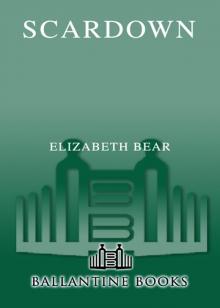 Scardown
Scardown Worldwired
Worldwired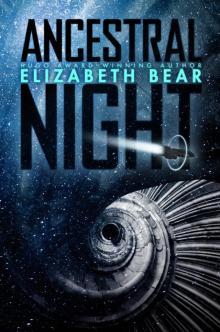 Ancestral Night
Ancestral Night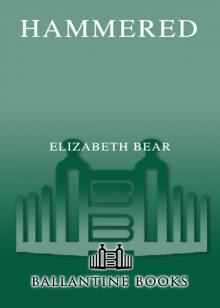 Hammered
Hammered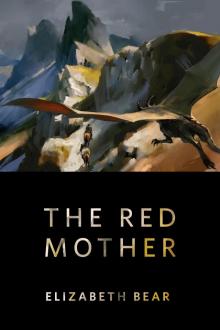 The Red Mother
The Red Mother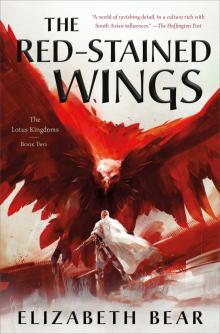 The Red-Stained Wings--The Lotus Kingdoms, Book Two
The Red-Stained Wings--The Lotus Kingdoms, Book Two Machine
Machine Some of the Best from Tor.com: 2019 Edition
Some of the Best from Tor.com: 2019 Edition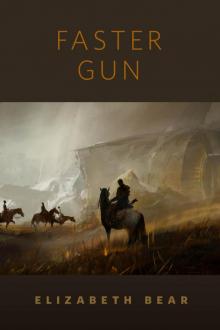 Faster Gun
Faster Gun In the House of Aryaman, a Lonely Signal Burns
In the House of Aryaman, a Lonely Signal Burns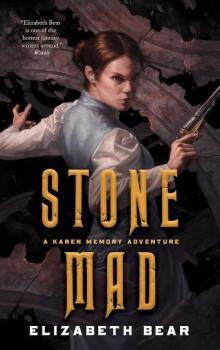 Stone Mad
Stone Mad Robots: The Recent A.I.
Robots: The Recent A.I.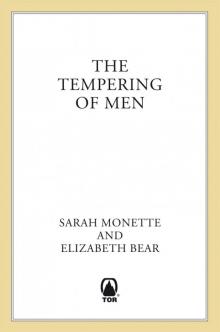 The Tempering of Men
The Tempering of Men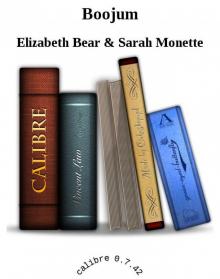 Boojum
Boojum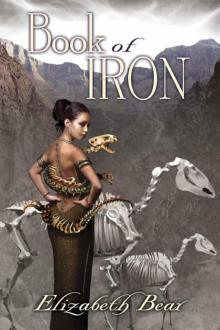 Book of Iron bajc-2
Book of Iron bajc-2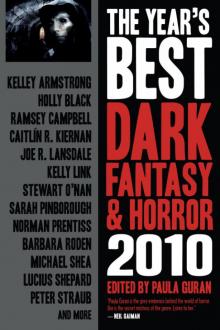 The Year's Best Dark Fantasy and Horror, 2010
The Year's Best Dark Fantasy and Horror, 2010 New Cthulhu 2: More Recent Weird
New Cthulhu 2: More Recent Weird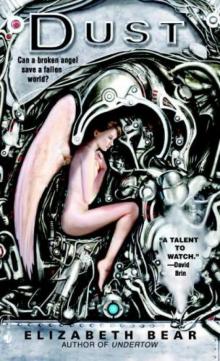 Dust jl-1
Dust jl-1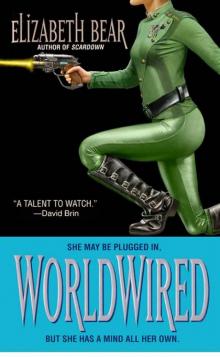 Worldwired jc-3
Worldwired jc-3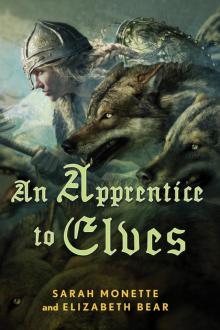 An Apprentice to Elves
An Apprentice to Elves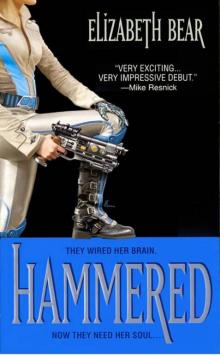 Hammered jc-1
Hammered jc-1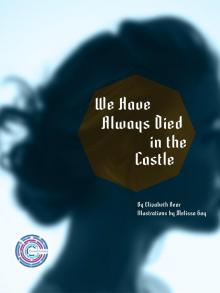 Crowd Futures: We Have Always Died in the Castle
Crowd Futures: We Have Always Died in the Castle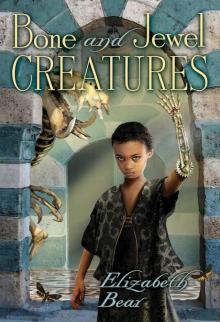 Bone and Jewel Creatures bajc-1
Bone and Jewel Creatures bajc-1 Carnival
Carnival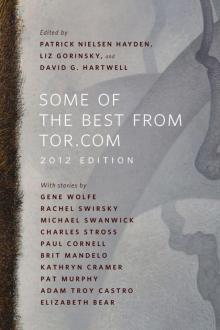 Some of the Best from Tor.com: 2012 Edition: A Tor.Com Original
Some of the Best from Tor.com: 2012 Edition: A Tor.Com Original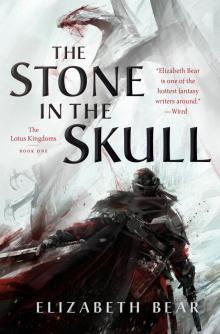 The Stone in the Skull
The Stone in the Skull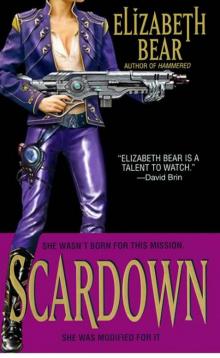 Scardown jc-2
Scardown jc-2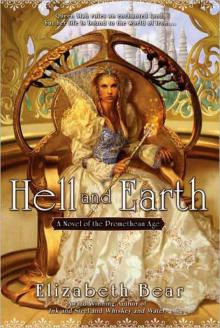 Hell and Earth pa-4
Hell and Earth pa-4 Undertow
Undertow Mermaids and Other Mysteries of the Deep
Mermaids and Other Mysteries of the Deep A Companion to Wolves
A Companion to Wolves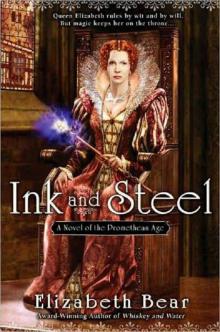 Ink and Steel pa-3
Ink and Steel pa-3